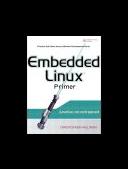Книга: Embedded Linux Primer: A Practical, Real-World Approach
12.1.1. "Hello World"Embedded
12.1.1. "Hello World"Embedded
A properly configured cross-development system hides a great deal of complexity from the average application developer. Looking at a simple example will help uncover and explain some of the mystery. When we compile a simple "hello world" program, the toolchain (compiler, linker, and associated utilities) makes many assumptions about the host system we are building on and the program we are compiling. Actually, they are not assumptions, but a collection of rules that the compiler references to build a proper binary.
Listing 12-1 reproduces a simple "hello world" program.
Listing 12-1. Hello World Again
#include <stdio.h>
int main(int argc, char **argv) {
printf("Hello Worldn");
return 0;
}
Even the casual application developer will realize some important points about this C source file. First, the function printf() is referenced but not defined in this file. If we omit the #include directive containing the prototype for the printf() function, the compiler emits the familiar message:
hello.c:5: warning: implicit declaration of function 'printf'
This introduces some interesting questions:
• Where is the file stdio.h located, and how is it found?
• Where does the printf() function live, and how is this reference resolved in the binary executable?
Somehow it seems that the compiler just knows how to put together a proper binary file that is executable from the command line. To further complicate matters, the final executable contains startup and shutdown prologue code that we never see but that the linker automatically includes. This prologue deals with details such as the environment and arguments passed to your program, startup and shutdown housekeeping, exit handling, and more.
To build the "hello world" application, we can use a simple command line invocation of the compiler, similar to this:
$ gcc -o hello hello.c
This produces the binary executable file called hello, which we can execute directly from the command line. Defaults referenced by the compiler provide guidance on where include files will be found. In a similar fashion, the linker knows how to resolve the reference to the printf() function by including a reference to the library where it is defined. This, of course, is the standard C library.
We can query the toolchain to see some of the defaults that were used. Listing 12-2 is a partial listing of the output from cpp when passed the -v flag. You might already know that cpp is the C preprocessor component of the gcc toolchain. We have added some formatting (whitespace only) to improve the readability.
Listing 12-2. Default Native cpp Search Directories
$ cpp -v
Reading specs from /usr/lib/gcc-lib/i386-redhat-linux/3.3.3/specs
Configured with: ../configure --prefix=/usr --mandir=/usr/share/man --infodir=/usr/share /info --enable-shared --enable-threads=posix --disable-checking --disable-libunwind-exceptions --with-system-zlib --enable-__cxa_atexit --host=i386-redhat-linux
Thread model: posix
gcc version 3.3.3 20040412 (Red Hat Linux 3.3.3-7)
/usr/lib/gcc-lib/i386-redhat-linux/3.3.3/cc1 -E -quiet -v -
ignoring nonexistent directory "/usr/i386-redhat-linux/include"
#include "..." search starts here:
#include <...> search starts here:
/usr/local/include
/usr/lib/gcc-lib/i386-redhat-linux/3.3.3/include
/usr/include
End of search list.
/usr/lib/
This simple query produces some very useful information. First, we can see how the compiler was configured using the familiar ./configure utility. The default thread model is posix, which determines the thread library your application gets linked against if you employ threading functions. Finally, you see the default search directories for #include directives.
But what if we want to build hello.c for a different architecture, such as PowerPC? When we compile an application program for a PowerPC target using a cross-compiler on our host machine, we must make sure that the compiler does not use the default host include directories or library paths. Using a properly configured cross-compiler is the first step, and having a well designed cross-development environment is the second.
Listing 12-3 is the output from a popular open-source cross-development toolchain known as the Embedded Linux Development Kit (ELDK), assembled and maintained by Denx Software Engineering. This particular installation was configured for the PowerPC 82xx toolchain. Again, we have added some whitespace to the output for readability.
Listing 12-3. Default Cross-Search Directories
$ ppc_82xx-cpp -v
Reading specs from /opt/eldk/usr/bin/.. /lib/gcc-lib/ppc-linux/3.3.3/specs
Configured with: ../configure --prefix=/usr --mandir=/usr/share/man --infodir=/usr/share /info --enable-shared --enable-threads=posix --disable-checking --with-system-zlib
--enable-__cxa_atexit --with-newlib --enable-languages=c,c++ --disable-libgcj --host=i386-redhat-linux -target=ppc-linux
Thread model: posix
gcc version 3.3.3 (DENX ELDK 3.1.1 3.3.3-10)
/opt/eldk/usr/bin/../lib/gcc-lib/ppc-linux/3.3.3/cc1 -E -quiet -v -iprefix /opt/eldk/usr/bin/.. /lib/gcc-lib/ppc-linux/3.3.3/ -D__unix__ -D__gnu_linux__ -D__linux__ -Dunix -D__unix -Dlinux -D__linux -Asystem=unix -Asystem=posix --mcpu=603
ignoring nonexistent directory "/opt/eldk/usr/ppc-linux/sys-include"
ignoring nonexistent directory "/opt/eldk/usr/ppc-linux/include"
#include "..." search starts here:
#include <...> search starts here:
/opt/eldk/usr/lib/gcc-lib/ppc-linux/3.3.3/include
/opt/eldk/ppc_82xx/usr/include
End of search list.
Here you can see that the default search paths for include directories are now adjusted to point to your cross versions instead of the native include directories. This seemingly obscure detail is critical to being able to develop applications and compile open-source packages for your embedded system. It is one of the most confusing topics to even experienced application developers who are new to embedded systems.
- Восстановление "безнадежных" баз данных. InterBase Surgeon
- Основные "рычаги" управления производительностью
- Using Double Quotes to Resolve Variables in Strings with Embedded Spaces
- 4.11.4. Правила "все кроме"
- 5.5. ПРИМЕР РАЗРАБОТКИ ОПИСАНИЯ ПРОЦЕССА "КИПЯЧЕНИЕ ВОДЫ В ЧАЙНИКЕ"
- Рис. 201. Выберите "Через высокоскоростное подключение, запрашивающее имя пользователя и пароль"
- Доступ к "внешним" переменным
- Пример 7-1. Что есть "истина"?
- Пример 5-1. Вывод "причудливых" переменных
- Disk Quotas
- Implementing Quotas
- Manually Configuring Quotas




